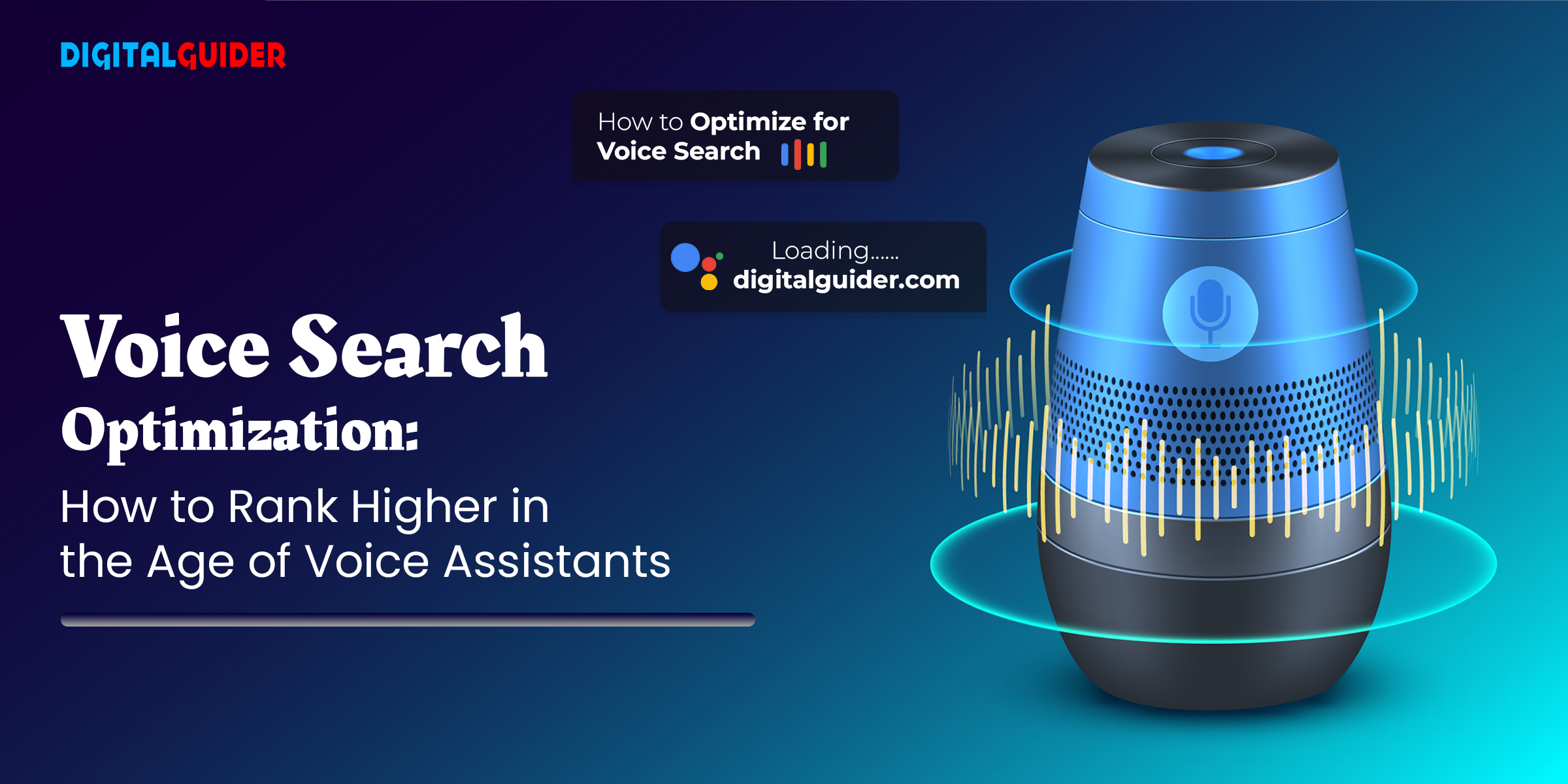Last Updated on April 18, 2024 by Austin Robin
From the Jetsons to Iron Man, talking to robotic assistants has always been a sci-fi dream.
But now, it’s our reality.
With virtual assistants like Siri and Alexa, finding the nearest taco stand or day spa has never been easier.
Voice search has become the norm, as it’s faster and more convenient than typing a query on search engines.
However, there’s a catch: voice search queries differ from text searches. Voice searches are more conversational than text based searches.
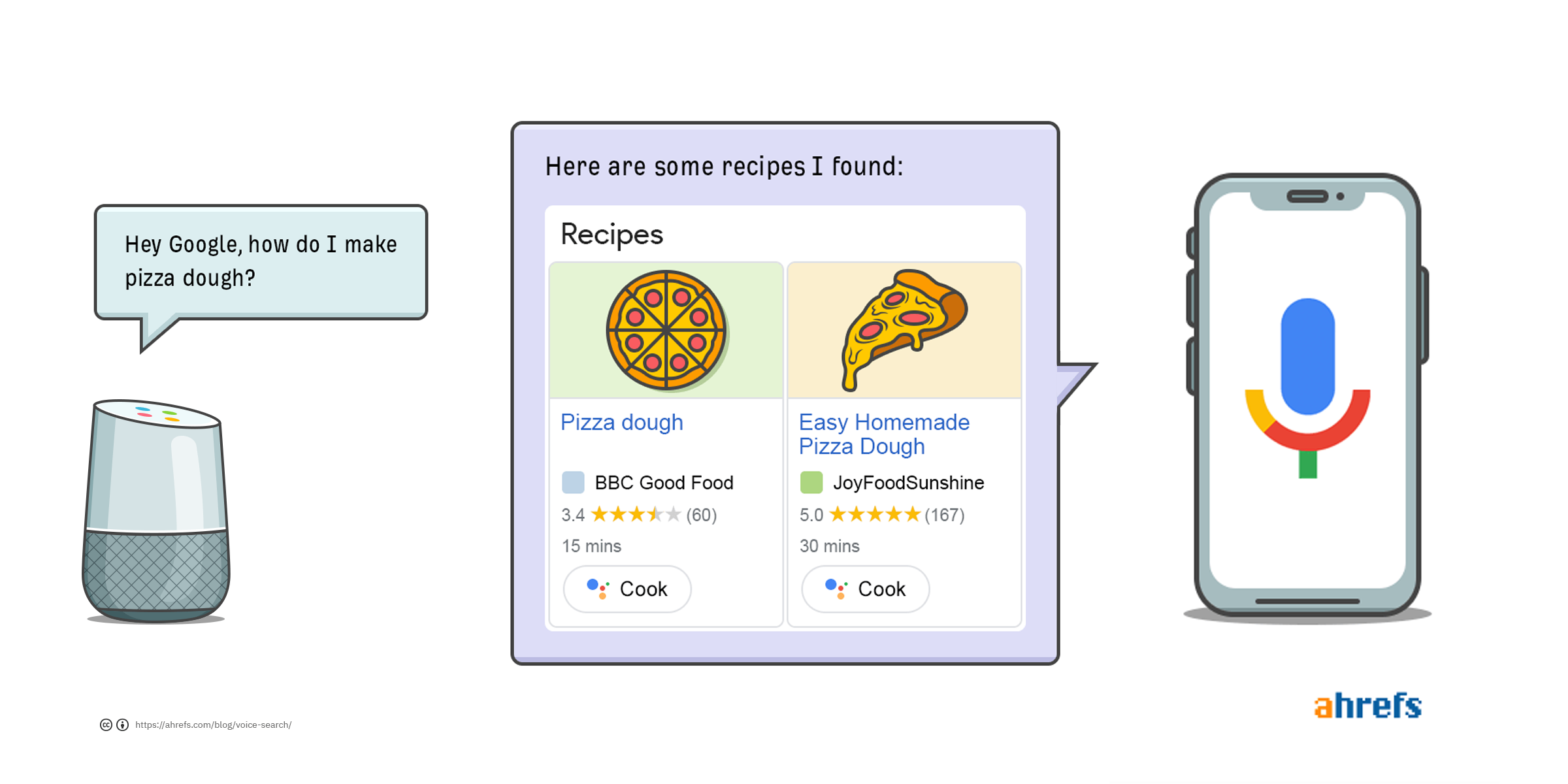
Image Source: Ahrefs
However, with voice-assisted devices only voicing out the top one to three search results for any voice search query, voice search optimization becomes the need of the hour for every business.
If you want to leverage your website traffic for more traffic, you need top-notch content and voice search optimization techniques on your website to land that coveted spot.
In this blog, we’ll show you how to do just that.
What is Voice Search?
Voice search technology allows users to search for information on the internet using their voice instead of typing in a search query. With voice search, you can ask your voice-assisted device a question or give it a command, and it will respond with relevant information or actions.
What Is Voice Search Optimization?
Voice search optimization is the approach of optimizing your website or content to make it more visible and accessible to users who use voice assistants like Siri, Alexa, or Google Assistant to search for information online.
This means creating conversational, short-form content that answers frequently asked questions, optimizing for local search, and using natural language processing (NLP).
By doing this, you can increase your visibility and reach users who use voice assistants to find information, which is increasingly important as voice assistants become more widespread.
How Does Voice Search Affect Your SEO?
Whenever you ask your voice assistant a question, it doesn’t read out a list of results.
Instead, it provides you with one answer – the featured snippet.
You need to optimize for the featured snippet if you want your website content to get featured in zero position.
But how do you do that?
Well, it starts with understanding the intent behind the question. When someone asks a question verbally, they tend to use more natural language than when they type it out. Therefore, your content needs to be conversational and answer the question in a way that makes sense to the user.
Most voice searches are for local queries, like “Which is the nearest coffee shop?” Therefore, optimizing your website and Google My Business listing for local SEO is essential. This means including your business’s name, address, and phone number on your website and ensuring that your Google My Business listing is updated.
How does Voice Search work?
Voice searches can be tricky.
Many different algorithms and computational methods are used to understand speech, convert it into text and enhance transcription accuracy. Natural language processing (NLP) is one of the most commonly used approaches.
While NLP is not an algorithm for speech recognition, it is a branch of AI that focuses on the communication between humans and machines through language, speech, and text.
All search queries go through the following five stages of speech recognition.
Filtering Out Background Noise
When you start a voice search, your voice search assistant will automatically mute any background noise to ensure it only listens to your voice.
Digitizing the Voice Search Query
The voice search assistant then digitizes the query, turning the sound waves into digital data. Using an extensive vocabulary database, audio recognition technology translates the user’s words into digital text data.
Conducting Voice Analysis
Once your digitized voice search query is processed, the voice search assistant conducts a voice analysis by processing the digital data.
Connecting to External Data Sources
After conducting a voice analysis, the voice search assistant connects to external information data sources, such as Google Search, to find and deliver relevant answers. This is where the search engine algorithms come into play, matching the voice search query with the most appropriate online content.
Recognizing Patterns
Finally, the voice search assistant recognizes patterns and compares the query to existing samples in the database. The more the user uses the voice search assistant, the more it adapts to their specific voice and language patterns, improving its accuracy and relevance to the user.
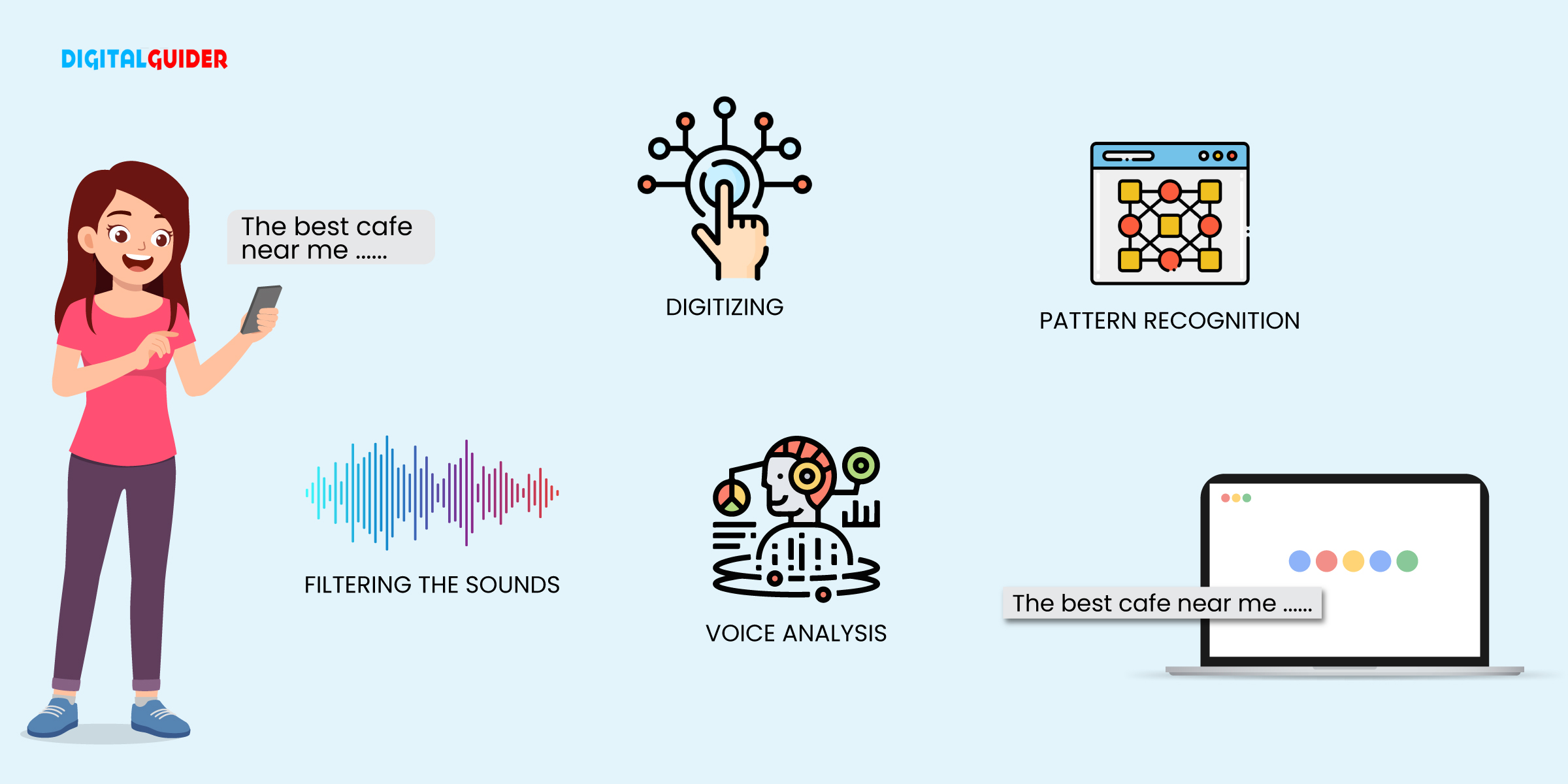
How Are Voice Search Queries Different From Traditional Search Queries?
With voice search becoming increasingly popular, it’s important to know how it’s different from text search. Sure, there are some similarities, but key differences must be considered when optimizing.
When you’re using voice search, you’re talking more naturally and asking longer, more complicated questions than you would when you’re typing in a search question.
For instance, if you’re looking for the best restaurants near you, you might type in “Best restaurants near me” but then ask your voice assistant, “What are the best restaurants in my area.”
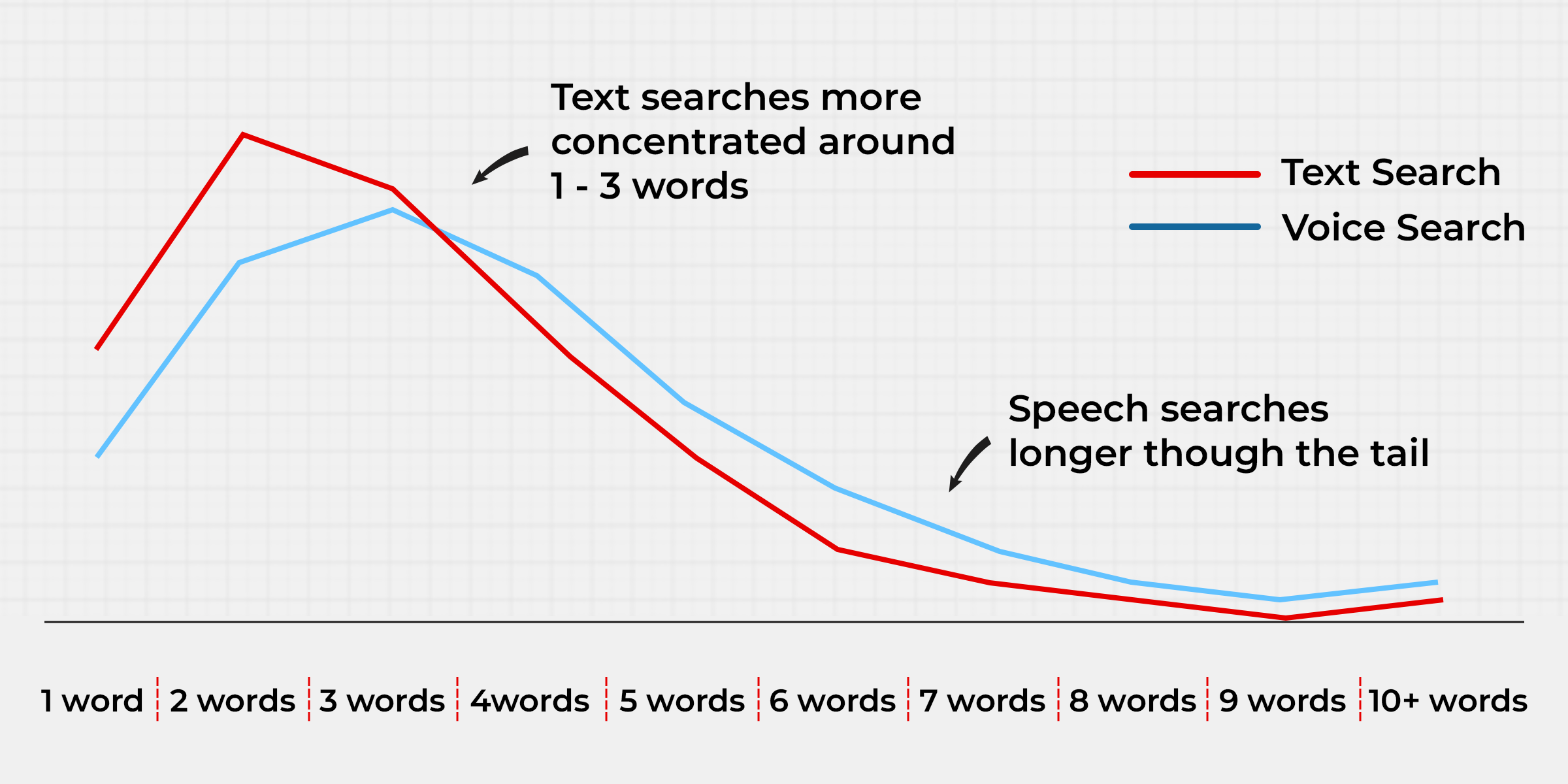
Search engines have gotten used to conversational search, which means they’re looking for the intent behind the words in a query instead of just the specific keywords themselves. That means you don’t just have to focus on keywords – you must create content that is SEO optimized & speaks to your audience’s needs and wants quickly.
Search engine bots better understood the meanings of longer, more conversational questions and delivered relevant results as voice search became increasingly popular.
The Hummingbird and BERT algorithm upgrades by Google switched attention to searcher intent by identifying the underlying meaning of queries (rather than just the specific terms in a query) and offering more relevant results to more conversational voice inquiries.
You only get one response when you search with your voice because you’re usually looking for a fast response, and search engines don’t want to overwhelm you with too many options.
Giving searchers immediate responses improves customer service and their general level of satisfaction, but this also implies that fewer people will visit your website because they would instead call or make a purchase right from the SERP.
What Types Of Business Benefit Most From Voice Search Marketing?
Voice search is becoming more popular than ever and can be a game-changer for various businesses like-
Local businesses
Optimizing for voice search is crucial if you’re a local business, such as a restaurant, a hair salon, or a retail store. That’s because many people use voice search to find businesses near them, such as “Find a coffee shop near me” or “Where’s the closest gas station?” Optimizing your website and other online listings for voice search can increase your chances of being found by potential customers looking for businesses like yours in their area.
E-commerce businesses
Your E-commerce Business can sell more products online by optimizing for voice search; you can reach a wider audience and improve your conversion rates. Many people use voice search to shop online, such as “Find me a new pair of running shoes” or “Order me some more cat food.” Optimizing your e-commerce business product descriptions and other content for voice search can make it easier for people to find and purchase your products.
Service-based businesses
Many people use voice search to find service providers, such as “Find me a good tax accountant” or “Who’s the best lawyer in town?” If you offer services like accounting, legal advice, or cleaning, optimizing for voice search can help you attract more clients. Voice search optimization can increase your chances of being found by potential clients looking for services like yours.
Travel businesses
If you’re a travel business, voice search optimization can help you get more customers and give them a better experience. It’s no secret that voice search is one of the most popular ways people plan their trips.
Whether it’s to find out what’s best in Paris or how to find a great hotel in Miami, voice search is a great way to get the info people need to make their travel plans.
With voice search SEO, you can give people more details for planning their trips, and this may also choose you as their travel provider.
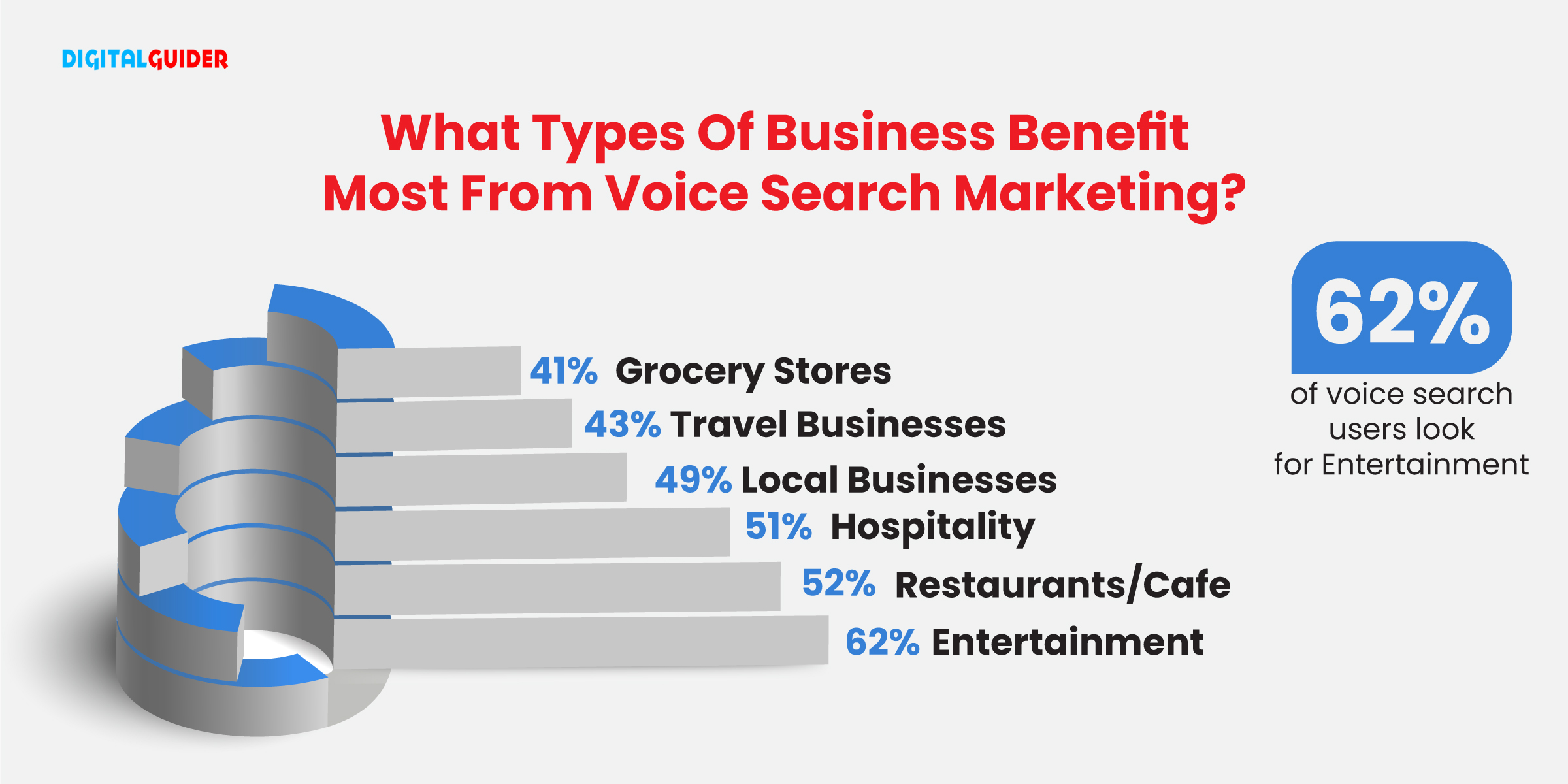
Voice Search SEO Tips- How to optimize for voice search?
Voice search is here to stay. The good news is that voice search optimization doesn’t need. This means that most of your SEO for voice search activities will improve your website’s search visibility.
Let’s see various tips to help you optimize your website for voice search.
Target Long-Tail & Question-Based Keywords
When optimizing for voice search, using long-tail keywords that mimic natural language is important. The main purpose is to convert “robotic” keywords into natural language keywords.
This is because people tend to use conversational language when speaking to voice assistants, so you want to make sure your website content matches those natural language queries.
Below is an example of what an automated search query will look like against a voice search query.
- Automated/ search engine-based query – Pizza recipe
- Longtail/ conversational query – How do I make a cheesy pizza?
Focusing your content on long-tail keywords, like question keywords, is a good idea to get the most out of voice search. This way, you’ll be able to capture traffic from users who ask longer, more detailed questions. Long-tail keywords are keywords that are 3 or more words long, and they’re a key part of keyword optimization.
They’re more tailored to the user’s intent, so you’ll get more traffic with high-intent queries. Plus, you can narrow them down so they’re more specific to your business, like “cafes near Denver” instead of “cafes,” which means you’ll have fewer competitors on the search results page.
Consider the “who,” “what,” “when,” “where,” and “how” questions that people are most likely to ask. Put these questions in your website business blogs and give them a quick, easy-to-understand answer. After you’ve answered the first question, you can also explain more about them in the rest of your content.
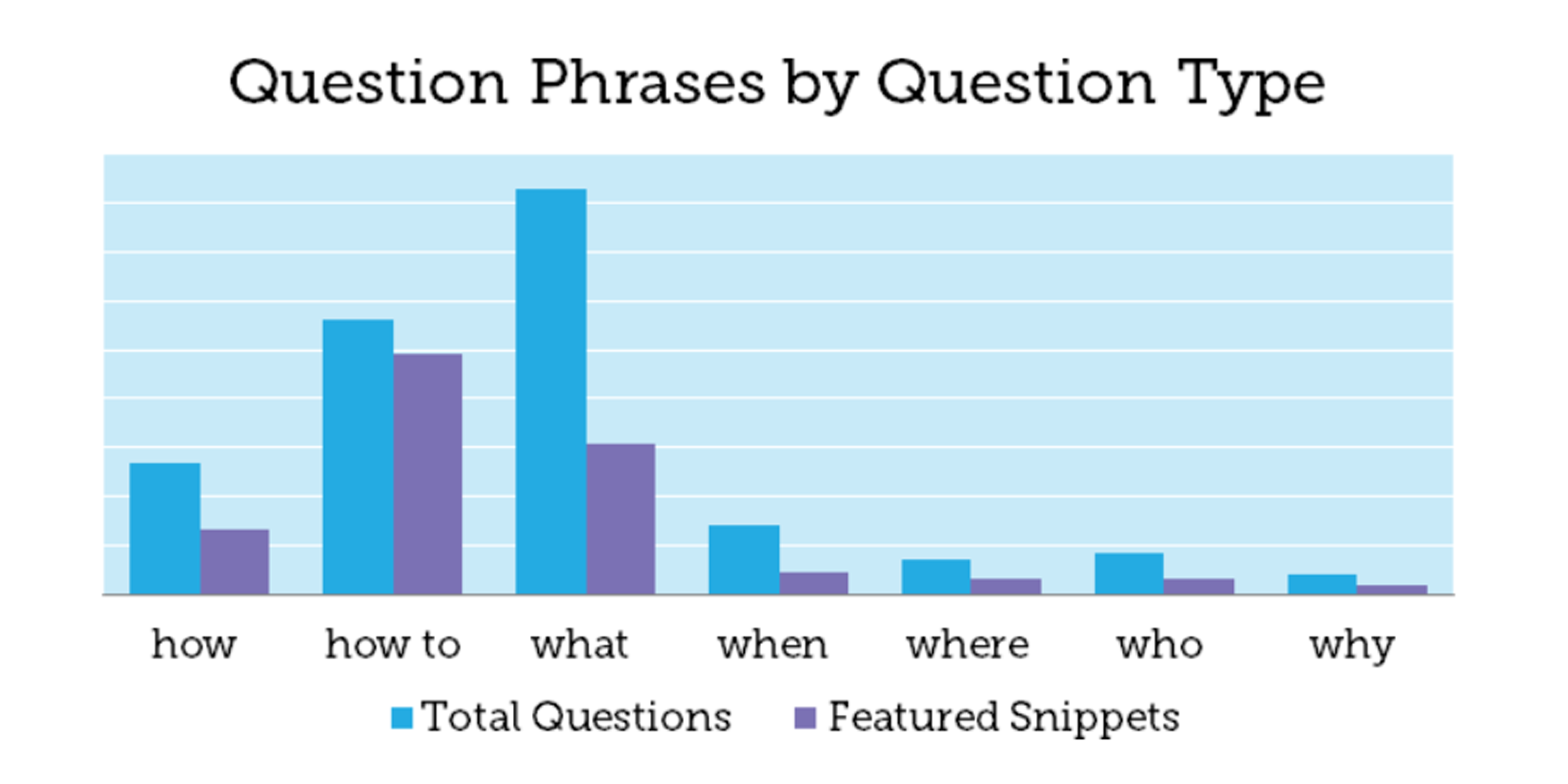
Claim Your Google Business Profile
Your Google Business profile plays an important role here. Voice search results often include information from these profiles, so a full listing means your business has a better chance of ranking for local voice searches.
An optimized Google business profile is the best thing you can do for your site’s overall SEO, especially if you’re a traditional business.
Your Google Business Profile is often the only way searchers find out about your business, so make sure it’s always up to date and optimized properly for “ near me “ searches in your target location.
You could also ensure everything is set up properly by using your phone or voice assistant device to run voice searches for your business.
Optimize your content for local & near me queries.
Voice searches have also changed the state of local searches. Most voice searches are local, so if you’re looking for a certain product, store, or service near you, you’re more likely to use your voice. Local mobile searches are also more likely to result in you going to the store on the same day.
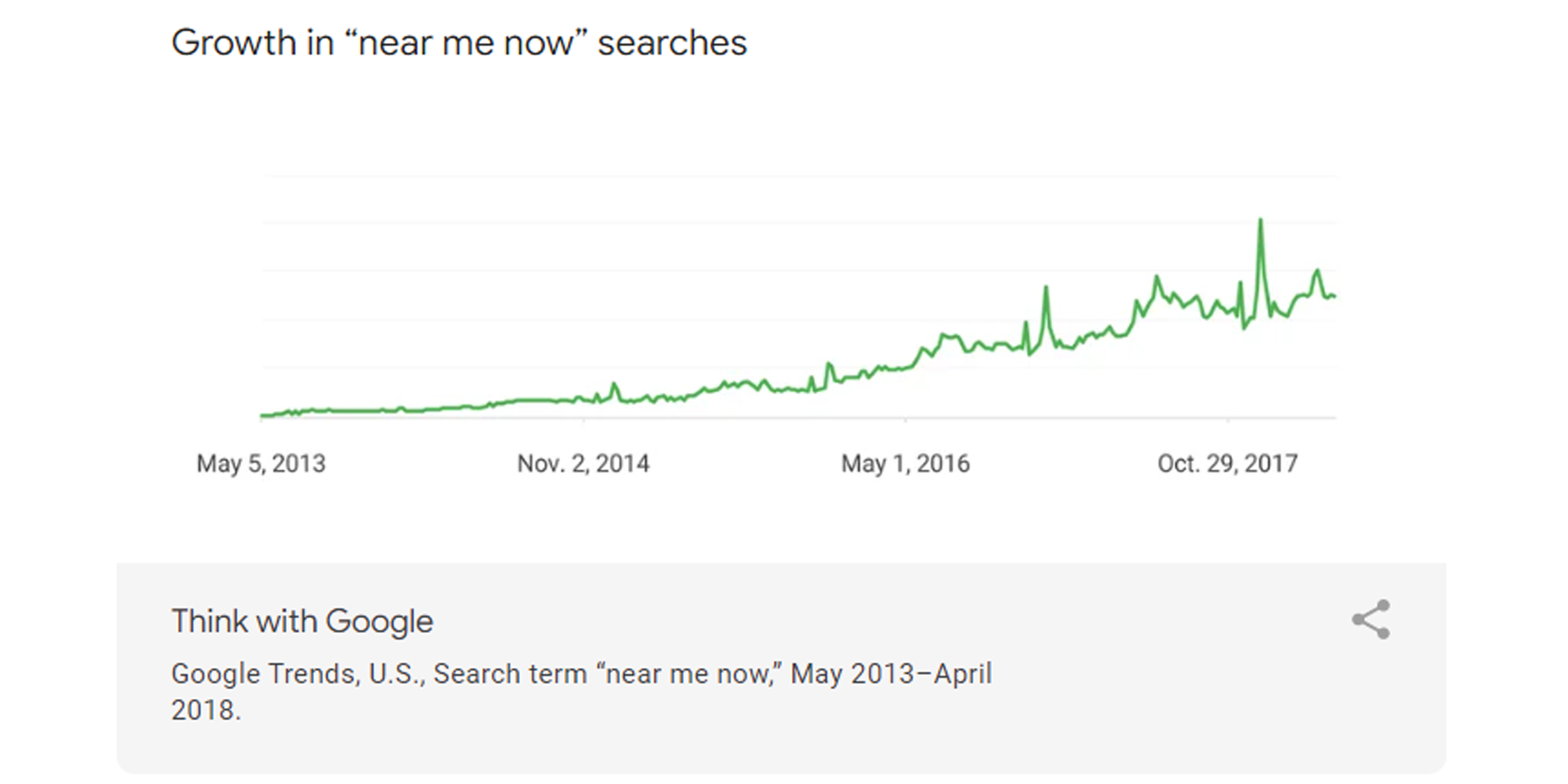
For local SEO benefits, list your business locations. Many voice search queries ask for things like “near me” and “in my area.” For instance, if your business is based in New York, you must add keywords to your website that include the city’s name. That way, whenever someone searches for something related to your business in New York, your store will show higher results. Also
Include Structured Data In Your Website Content
Ask your voice-assisted device, which is the world’s largest country. If the device hears you properly, you will get an instant answer – Russia, with the website’s source, has picked the answer.
If not millions, thousands of websites must have answers to this particular question. Why do you think the device only picked this specific website’s content?
The answer is simple- Structured Data.
Structured data indirectly affect rankings but can give you an edge regarding voice search.
Schema markup is another factor that affects a page’s search rankings. Web pages with speakable structured data can use the Google Assistant to distribute the content through new channels and reach a wider base of users.
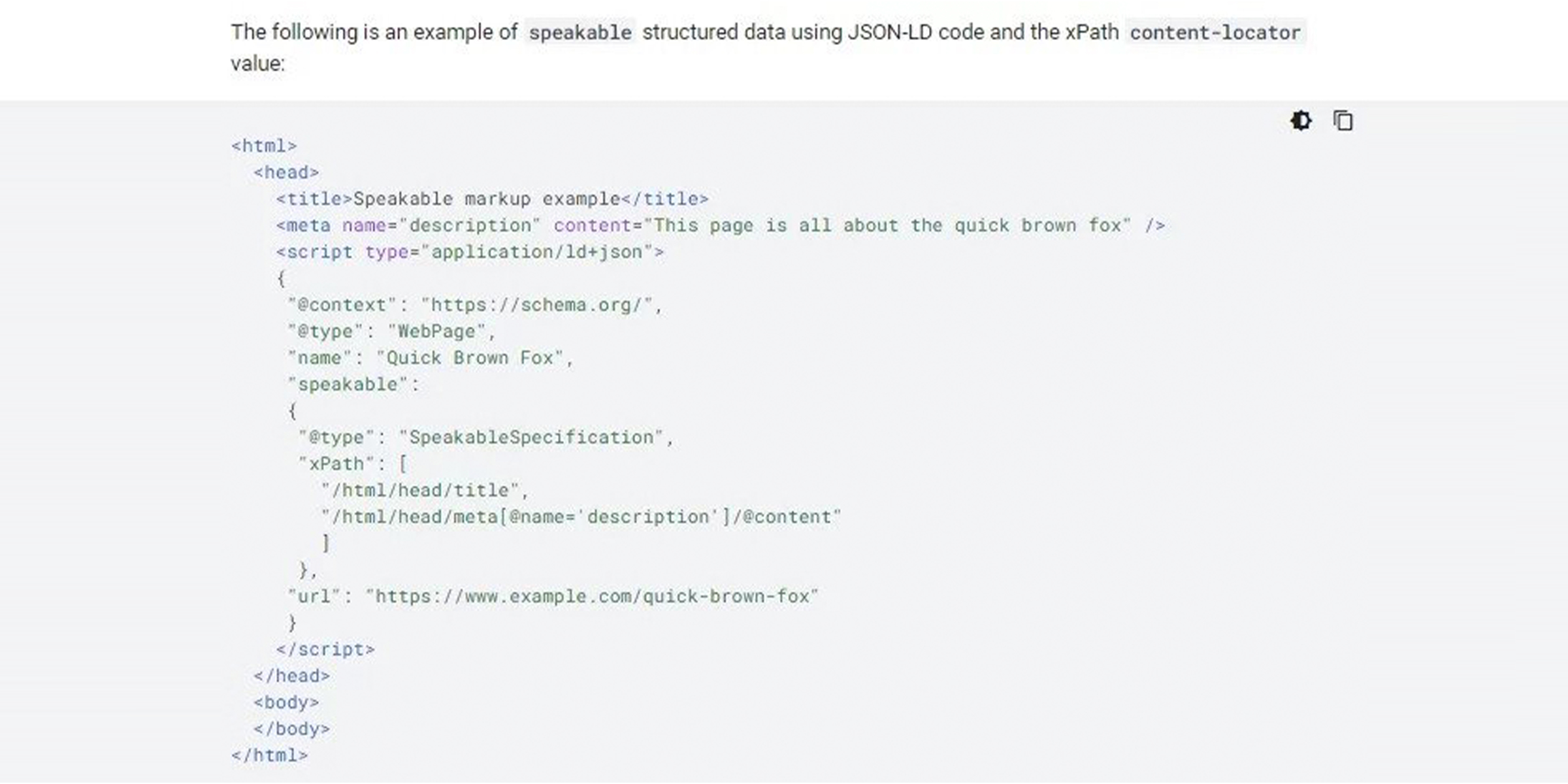
By using structured data, you’ll ensure that search engines like Google and others know exactly what you’re talking about and can sort it accordingly. This way, your content will show up as a response to a word-for-word search. You can add structured data to your website’s code, but using FAQ Schema to mark your FAQ pages is also a good.
Write Content In A Conversational Style.
Let’s repeat one more time: voice searches are more like conversations.
So make sure your content is conversational so you can meet people where they are.
Not only does it feel more real and easier to understand, but a less formal writing style is also seen as more appropriate for voice queries. Keep it to one paragraph and make it sound like you are talking to a 9th grader.
Semantic search considers context, what the user is looking for, and how the words on the page relate to each other. Optimize your content for zero search results that answer your customers’ questions, and Google will give you the bonus of appearing in featured snippets.
Make Your Website Mobile-friendly
As per reports by Global Web Index, about 27% of people online are using voice search on their phones.
Google understands that a good website mobile UX is critical to having an appealing website, which is why they consider it in their results.
If you want to appear at the top of the search results for text and voice queries, ensure your website is responsive and looks for ways to make it more responsive. This will keep you ahead of the competition in voice search.
Voice Search Optimization – Future Proof Your Website
If you want to outrank your competition & establish your brand, voice search optimization is a must-have.
As more & more people use voice assistants, it’s important to ensure your content is optimized for voice search. That way, you’ll be more visible and accessible to people who use voice assistants to find what they’re looking for online.
Digital Guider can help you create conversational, concise content that answers FAQs, optimize for local searches, and use natural language processing. Contact us now, so we can help you rank higher on SERPs.
Voice Search Optimization FAQ
How does voice search optimization differ from traditional SEO?
Traditional SEO focuses on optimizing content for text-based searches. In contrast, voice search optimization considers the natural language queries that users typically use when speaking to their voice assistants. Voice search optimization also emphasizes the need for concise and conversational content that is easily understood when read aloud.
What are the benefits of voice search optimization?
Voice search optimization can improve the visibility and accessibility of your website or content to users who rely on voice assistants to search for information. It can also help your business by attracting more traffic to your site.
How can I optimize my website for voice search?
To optimize your business website for voice search queries, you should create conversational content to answer commonly asked questions. Ensure your website is responsive & mobile-friendly, and optimized for local search, as voice searches are often location-based. Add structured data markup to your website to help search engines understand your content better.
What kind of content is best for voice search optimization?
Content that is concise, conversational, and provides quick answers to commonly asked questions is ideal for voice search optimization. FAQs, how-to guides, and listicles are all great formats for voice search optimization.
How to create voice search-optimized content?
Use tools like Answer the Public and Google’s “People also ask” feature to research the types of questions your target audience is asking. Use these questions to guide your content creation and focus on providing clear, concise answers that use natural language. If you need any site optimization assistance, our SEO experts are here to help you. Get a free consultation call now @ +1-307-209-3608
What role does natural language processing (NLP) play in voice search optimization?
NLP is essential to voice search optimization because it enables search engines to understand the context and intent behind users’ spoken queries. Using natural language in your content and optimizing it for NLP improves your chances of ranking higher in voice search results.
How important is local search optimization for voice search?
Local search optimization is critical for voice search because voice searches are often location-based. By optimizing your website and content for local search, you can improve your visibility and accessibility to users who are searching for information about businesses or services in their local area. Partner with top local SEO service providers with expertise in understanding the local audience better & know how to boost store traffic. Get a free consultation call now @ +1-307-209-3608
What is the future of voice search optimization?
The future of voice search optimization will likely involve more advanced technologies like natural language generation and speech recognition. As the use of voice assistants is growing, businesses will need to optimize their SEO strategy to stay ahead of the competition.
How to measure the voice search optimization efforts?
To measure the success of your voice search optimization efforts, track your website traffic and rankings for voice search queries. You can also use tools like Google Analytics and Search Console to monitor your performance and tweak your strategy. Or contact SEO auditing & tracking professionals who can make your technical task easy & will also guide you to increase your site traffic and conversions fast. Visit our site to learn more, or call us @ +1-307-209-3608 for a quick response.
